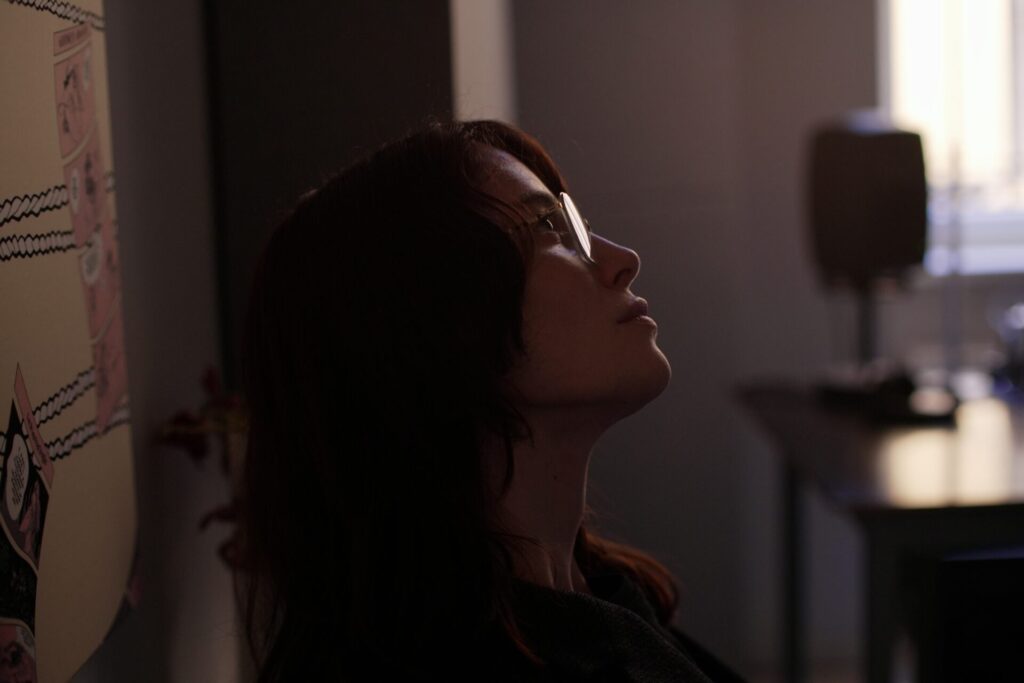Following on from the futurist folk and pagan techno of 2020’s debut album Fountain, Berlin-based composer Lyra Pramuk has created Hymnal, a devotional symphony to the universe that moves from feverish jig with banshee wails to beautifully sensuous vocal loops. Using her conservatoire training, Pramuk has worked with the Sonar Quartett string ensemble, interweaving breath, voice, and layered harmonies to investigate how we as humans connect with nature, technology and each other. One surprising instance of this can be seen with how she worked with poet Nadia Marcus to discrete units of words but also how the artist Jenna Sutela helped to “create a John Cage-inspired ‘I Ching environment’” by allowing a living slime mould physarum polycephalum to trace a path over these lyrical fragments, with the final result being an actual artistic collaboration with the single-celled organism.
Born in rural Pennsylvania, Pramuk moved to Berlin in 2013, finding her artistic and trans identity in the progressive clubs culture of the city. Here, her work has bloomed, partly through pop.soil – her own experimental hub and radio show – but also through a conceptual framework linked to astrology. For Pramuk, it has become a compelling passion. She practised privately for years, but is now offering her services publicly, and plans to do astrological readings at festivals while she is on tour.
Here she explains why astrology underscores her latest record (due out this week), and how it enables her to imagine a different, more radiant future.
Astrology is a language
Astrology is relational. How do we relate to the planets, these wandering astral bodies? Also, how are we in relation with each other? It’s a discipline and a tool. It made me question my preconceptions of such ideas as autonomy and free will. I don’t think that the stars control us like puppets, [rather] I’ve learned to see human beings as similar to subatomic particles in a cloud of motion. On our Earth, it’s easy to perceive humans like an ant colony – are we actually controlling everything that we’re doing, or are we part of an energetic thermodynamic system? I’m a big advocate for free will, autonomy and liberation. At the same time, I’ve started to see our free will as a collaboration with the universe. There’s a propulsion, a kind of action on us by energetic principles that we’re a part of.
My elevator pitch for the ascendant
Popular astrology happened because newspapers wanted to sell horoscopes, but with the emphasis on sun signs we lost the idea of the ascendant, which is so important because it’s linked to the time of your birth. It’s the map for your whole chart, kind of like your operating system, to use a fun technological analogy.
Pluto in Aquarius means revolution
On a global level, Pluto recently went into Aquarius. Pluto is a [dwarf planet] associated with primal transformation. Think of the symbol of the phoenix rising from the ashes, or a private investigator, uncovering, sleuthing, bringing things to the surface. Freudian or Jungian psychoanalysis really began to flourish in the 1930s, at the time that Pluto was discovered. When Pluto went into Capricorn in 2008, there was the big financial crash. We realized there was a lot hidden underneath the systems and structures that our world built that is untenable and maybe that we didn’t want to see. Following Capricorn is the archetype of Aquarius, a sign of humanitarian goodness, of social progress, technology and visionary ideas. Pluto in Aquarius is about revolutions: uncovering power, and radicalisation around power. The last time Pluto was in Aquarius was during the French and American Revolutions, the Irish uprising, and the Haitian rebellion, right? That could be some indication of the tenor of things now. This whole story will be about bringing power back to people.
But it’s complicated by this technological aspect
Mary Shelley’s Frankenstein was published in 1818, when the sun was in Aquarius. I’m bringing up Frankenstein, because there’s this other technological aspect to Aquarius, which is artificial intelligence and robotics. How this plays into the humanitarian revolution will be really integral. [Frankenstein’s creation] is like a human, but not; literally brought to life through electricity. He has redeeming characteristics, but people are afraid of this new energy. Obviously, AI companies are not decentralised community-run and ethically regulated. They’re capitalistic entities built in a gold rush on top of the bones and brutality of everything that that colonialism brought us. That scares me, and fear is valid, but it also feels inevitable. So we have to learn how to negotiate it. We have to hold a lot of contradictions and complexity in place in order to steward this, because it will change what it means to be human.

I’m a Virgo rising
I have the tenth house in Gemini, which at the moment is about my career moving into the next phase. Because I’m doing an album campaign, the sun in Gemini, for me, is a lot about rolling out press, talking with people about my work. It’s a very chatty time, and I think it’s going to get even chattier. Astrology has become a language and a lens through which I perceive the world. It’s so fundamentally altered my perception of reality that I’m now making music within that frame, and I’d say that studying my own chart has helped me to understand where my strengths are as an artist and musician.
Divination is a way of resisting
It’s never been enough for me to just exist as a white trans person in the colonial capitalist architecture, and have my safety and my house, or resources, and just be like, ‘Oh, I’m good, I’m going to be happy, I’m going to live my life.’ I’ve been able to understand my values and my identity as a trans person especially through other trans artists, many of whom come from indigenous cultures, from Black and Latino communities who had a legacy of resistance in defining their own ethnic identities as trans people. I’ve done enough research to know that transgender people were [often] mediums and astrologers in Europe, even in the early 1900s. I feel very much connected to divination as a spiritual framework. It’s a vital way of resisting and imagining a future where, not only am I contributing to society, but I have my own identity that feels real.
Living and music-making in Berlin
I’ve learned so much from how Europeans prize and value culture, how they fight for it. Really growing into my adulthood in Berlin has allowed me to conceptualise and practice an artistic life that I would not be able to practice if I lived in the US. It’s a different framing and sense of cultural possibility. The US government is making really dangerous changes for a lot of people, trans people among them. I saw that and have built a life outside of that. When I felt the US wasn’t safe for me, I made the shift early and got ahead of it in a way.
A message to those that dub astrology ‘pseudoscience’…
Astrology is an ancestral practice, one that many indigenous people have perfected and learned. It’s a form of knowledge that requires immersion, multi-sensory [perception], and a lack of ego that is a threat to scientific absolutism and patriarchal military rule. I think music is a much more playful social space than astrology. But astrology is very social too. I find it really rewarding to create a more intimate space where I can use my analytical neurodivergent, very detail-oriented psyche to help others make sense of their lives through this language. There’s an intimacy and an immediacy of service and care that transcends what I can do with music. It’s integral to not just my art, but my practice as a human in community with other human beings.



